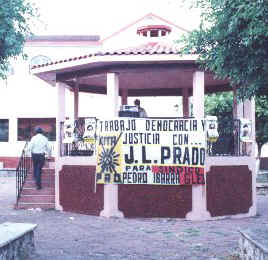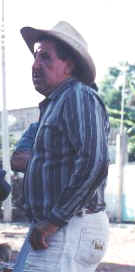 Luis Higareda, comisariado ejidal and PRD leader in Cerrito Cotijaran. Luis secured PRONASOL support for digging a new well, but the work was suspended in an effort to force the community to vote for the PRI.
Luis Higareda, comisariado ejidal and PRD leader in Cerrito Cotijaran. Luis secured PRONASOL support for digging a new well, but the work was suspended in an effort to force the community to vote for the PRI. Luis Higareda, comisariado ejidal and PRD leader in Cerrito Cotijaran. Luis secured PRONASOL support for digging a new well, but the work was suspended in an effort to force the community to vote for the PRI.
Luis Higareda, comisariado ejidal and PRD leader in Cerrito Cotijaran. Luis secured PRONASOL support for digging a new well, but the work was suspended in an effort to force the community to vote for the PRI.
The other major programmes which the Salinas regime introduced ostensibly to soften the impact of neoliberal restructuring were PRONASOL and PROCAMPO. PRONASOL was a social development programme, in which communities could receive state funding towards projects such as drinking water or paving roads, provided they agreed to contribute part of the cost and/or supply the necessary labour. Another aspect of the programme was the "créditos a la palabra" scheme, designed to help subsistence corn farming. In the Ciénega de Chapala, the programmes were subject to both abuse by local PRI authorities and manipulation for political ends. The PRONASOL programs supposedly designed to help marginal subsistence farmers were perverted in scandalous ways: poor day-labourers were paid to collect the credits, which were then pocketed by richer members of the communities and invested in non-agricultural activities. Little if any of the money found its way back into public works projects as intended. PRONASOL investments in infrastructure projects, such as drinking water, were used by the priísta administration in Villamar to force communities to defect from the PRD rather than simply to buy votes: the small community of Cerrito Cotijaran was told that a well negotiated by its perredista ejidal leaders would remain capped until they had delivered a 100% vote for the PRI in the 1991 congressional elections. Direct misuse of PRONASOL resources for electoral purposes was all too evident in the 1992 municipal electoral process which I witnessed at first hand.
The PROCAMPO programme was apparently something of a "U-Turn" in government policy, since it offered direct subsidies to farmers of the kind which, it was belatedly acknowledge, farmers in the US and Europe had long enjoyed. Its local impact in its first year of operation, 1994, can be adequately summarized by the fact that the campesinos insisted on calling the program "PRICAMPO". Such an outcome was perhaps predictable given that the money was being disbursed by the head of the SARH (Ministry of Agriculture) in the local irrigation district, who was also a leading element in the regional PRI electoral machine, much given to lecturing peasants about the need to end paternalism.
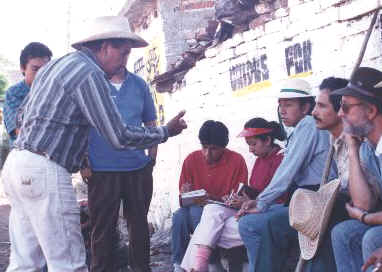 Luis recounting these events to students and colleagues from the Colegio de Michoacán in 1995.
Luis recounting these events to students and colleagues from the Colegio de Michoacán in 1995.
In later years, under Zedillo, however, more peasants received money, a reflection of the PRI's deteriorating political fortunes in the state. The 1995 state elections gave control of most rural municipios to the centre-left opposition PRD, and most urban municipios to the right-wing PAN, leaving the PRI holding merely the governorship. This has made Michoacán something of a special case. Although political manipulation of public resources continues, the weak PRI state administration has been forced to improve its performance in terms of delivering benefits to opposition voters.
Yet even when better administrated, these programmes have had little real impact on the deteriorating economic situation. PROCAMPO subsidies were merely designed to cushion the impact of driving domestic producer prices for maize down to world market levels, and are being progressively reduced over time, on the assumption that producers will turn to other crops in which Mexico has a "comparative advantage". In practice, this is wishful thing. The rate of subsidy is not sufficient to compensate for the continuing "price-cost" squeeze to which producers are being subjected, let alone give them a breathing space to think about growing a different crop which would be more profitable in the long term. As an ejidatario friend remarked to me in 1997, it would be more helpful if the government went back to subsidising the prices of seed and fertiliser, because he could no longer afford to sow more than a hectare even with the PROCAMPO money. The area of land sown has continued to fall, and many people are now constrained to sow without irrigation, because they can no longer afford to pay for the water.
Video Clip - Click on Quicktime Logo
![]() PROCAMPO was supposed to enable peasant farmers to switch from traditional maize cultivation to newer crops which would command better prices. In practice, however, maize cultivation by ordinary peasants in the Ciénega plain was already a shadow of what it had been in the early 1980s. This clip, shot in 1983, shows a maize harvest on the ejido plot of Luis Prado's father, Cleofas. Luis himself is supervising the harvest with his older ejidatario brother Jesús lending a hand, though he has no responsibility for his father's land nor share in the harvest. The workforce consists of Jesús's eldest son, Chuche, who now works for nine months of the year in the United States, but was, at the time, studying in the preparatoria with a view to entering a professional career and acting as the mainstay of his father's family labour farm. He has "invited" some of his school friends to join the work party, and Davíd, Cleofas's youngest son, is also working. Davíd qualified as a schoolteacher, but he too decided to opt for a migrant career in the mid-1980s, abandoning a post he had obtained in a school in a neighbouring state where another brother worked. Although Luis continued to be a teacher, and advanced in his career, financial pressures and a young family drove him too to take a few trips to California, where he slept rough in bush camps to maximise his savings. Three members of the harvest team are hired workers from landless families who were also habitual US migrants over several generations. The clip ends with some shots of the oldest member of this family. The main concern of this group of workers at the time was the threat posed to their livelihood by the introduction of harvesting of maize by combine, undergoing its first experimental trials at the time this film was taken. As seasonal harvest work diminished in the course of the ensuing decade, many members of these landless households began to prolong their sojourns in the United States. (Super-8 movie footage transferred to video, no sound.)
PROCAMPO was supposed to enable peasant farmers to switch from traditional maize cultivation to newer crops which would command better prices. In practice, however, maize cultivation by ordinary peasants in the Ciénega plain was already a shadow of what it had been in the early 1980s. This clip, shot in 1983, shows a maize harvest on the ejido plot of Luis Prado's father, Cleofas. Luis himself is supervising the harvest with his older ejidatario brother Jesús lending a hand, though he has no responsibility for his father's land nor share in the harvest. The workforce consists of Jesús's eldest son, Chuche, who now works for nine months of the year in the United States, but was, at the time, studying in the preparatoria with a view to entering a professional career and acting as the mainstay of his father's family labour farm. He has "invited" some of his school friends to join the work party, and Davíd, Cleofas's youngest son, is also working. Davíd qualified as a schoolteacher, but he too decided to opt for a migrant career in the mid-1980s, abandoning a post he had obtained in a school in a neighbouring state where another brother worked. Although Luis continued to be a teacher, and advanced in his career, financial pressures and a young family drove him too to take a few trips to California, where he slept rough in bush camps to maximise his savings. Three members of the harvest team are hired workers from landless families who were also habitual US migrants over several generations. The clip ends with some shots of the oldest member of this family. The main concern of this group of workers at the time was the threat posed to their livelihood by the introduction of harvesting of maize by combine, undergoing its first experimental trials at the time this film was taken. As seasonal harvest work diminished in the course of the ensuing decade, many members of these landless households began to prolong their sojourns in the United States. (Super-8 movie footage transferred to video, no sound.)
Electoral scandals. Click the picture to see more.
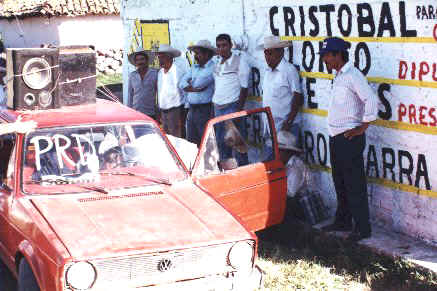
PRD local campaign, 1995. The former comisariado ejidal, Salvador Vargas, is third from the left.
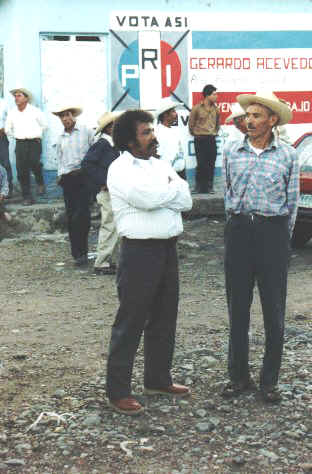
Luis Prado is candidate for sindico
